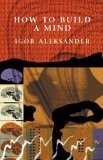What do you think?
Rate this book


Igor Aleksander heads a major British team that has applied engineering principles to the understanding of the human brain and has built several pioneering machines, culminating in MAGNUS, which he calls a machine with imagination. When he asks it (in words) to produce an image of a banana that is blue with red spots, the image appears on the screen in seconds.
The idea of such an apparently imaginative, even conscious machine seems heretical and its advocates are often accused of sensationalism, arrogance, or philosophical ignorance. Part of the problem, according to Aleksander, is that consciousness remains ill-defined.
Interweaving anecdotes from his own life and research with imagined dialogues between historical figures -- including Descartes, Locke, Hume, Kant, Wittgenstein, Francis Crick, and Steven Pinker -- Aleksander leads readers toward an understanding of consciousness. He shows not only how the latest work with artificial neural systems suggests that an artificial form of consciousness is possible but also that its design would clarify many of the puzzles surrounding the murky concept of consciousness itself. The book also looks at the presentation of "self" in robots, the learning of language, and the nature of emotion, will, instinct, and feelings.
Paperback
First published August 1, 2001